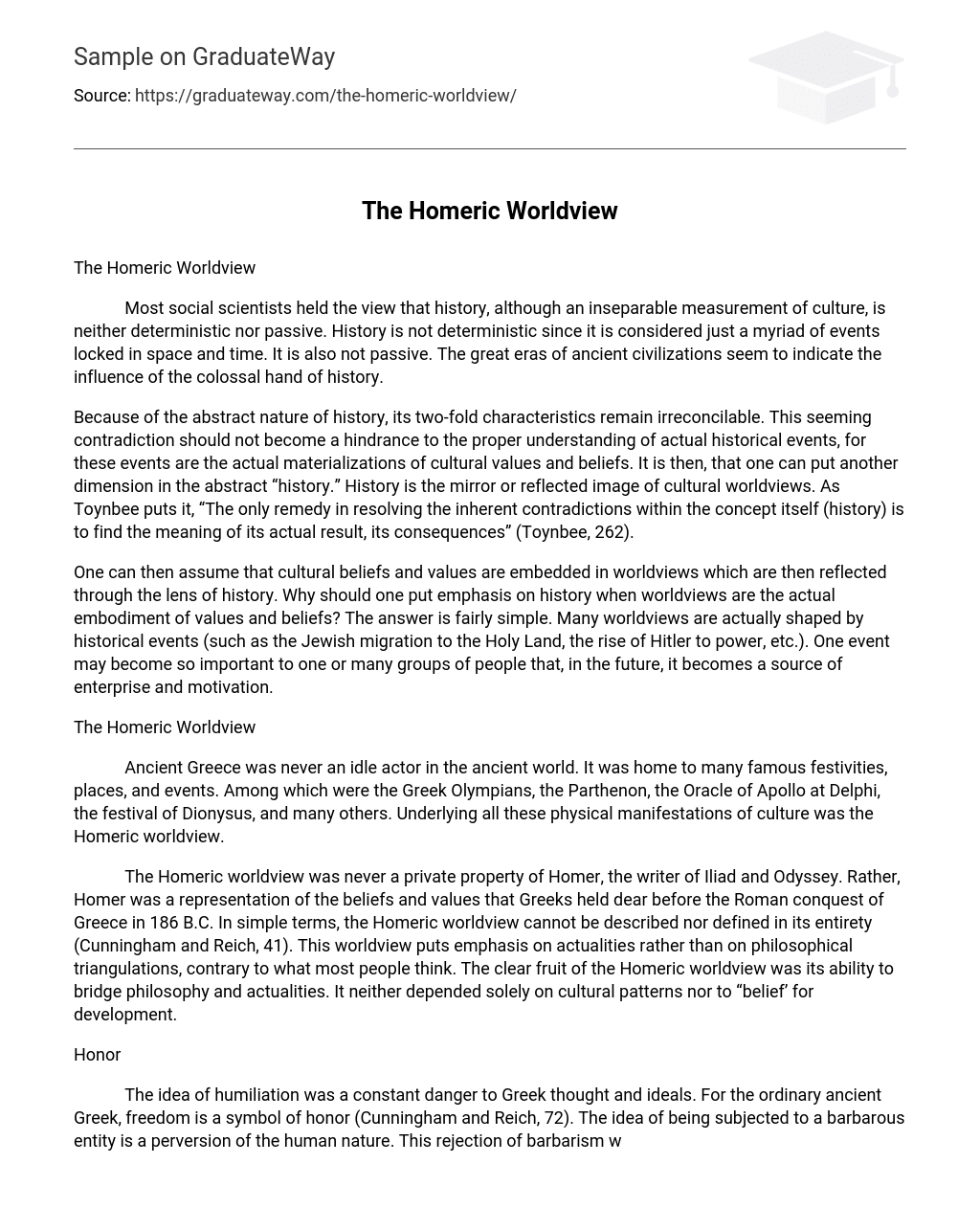Most social scientists held the view that history, although an inseparable measurement of culture, is neither deterministic nor passive. History is not deterministic since it is considered just a myriad of events locked in space and time. It is also not passive. The great eras of ancient civilizations seem to indicate the influence of the colossal hand of history.
Because of the abstract nature of history, its two-fold characteristics remain irreconcilable. This seeming contradiction should not become a hindrance to the proper understanding of actual historical events, for these events are the actual materializations of cultural values and beliefs. It is then, that one can put another dimension in the abstract “history.” History is the mirror or reflected image of cultural worldviews. As Toynbee puts it, “The only remedy in resolving the inherent contradictions within the concept itself (history) is to find the meaning of its actual result, its consequences” (Toynbee, 262).
One can then assume that cultural beliefs and values are embedded in worldviews which are then reflected through the lens of history. Why should one put emphasis on history when worldviews are the actual embodiment of values and beliefs? The answer is fairly simple. Many worldviews are actually shaped by historical events (such as the Jewish migration to the Holy Land, the rise of Hitler to power, etc.). One event may become so important to one or many groups of people that, in the future, it becomes a source of enterprise and motivation.
The Homeric Worldview
Ancient Greece was never an idle actor in the ancient world. It was home to many famous festivities, places, and events. Among which were the Greek Olympians, the Parthenon, the Oracle of Apollo at Delphi, the festival of Dionysus, and many others. Underlying all these physical manifestations of culture was the Homeric worldview.
The Homeric worldview was never a private property of Homer, the writer of Iliad and Odyssey. Rather, Homer was a representation of the beliefs and values that Greeks held dear before the Roman conquest of Greece in 186 B.C. In simple terms, the Homeric worldview cannot be described nor defined in its entirety (Cunningham and Reich, 41). This worldview puts emphasis on actualities rather than on philosophical triangulations, contrary to what most people think. The clear fruit of the Homeric worldview was its ability to bridge philosophy and actualities. It neither depended solely on cultural patterns nor to “belief’ for development.
Honor
The idea of humiliation was a constant danger to Greek thought and ideals. For the ordinary ancient Greek, freedom is a symbol of honor (Cunningham and Reich, 72). The idea of being subjected to a barbarous entity is a perversion of the human nature. This rejection of barbarism was, in itself, a full manifestation of indignation against tyranny and subjection. Note that when the Ionian cities in Asia Minor subject themselves to the rule of the Persians, they were labeled by the “Peninsular” Greeks as cowards, entities who had lost their freedoms, and ultimately honor. The same can be said during the Persian invasion of the Greek peninsula. When Athens was burned to the ground by Persian forces, the Athenian people fled to Sparta. They were never viewed as timid by other Greeks since there was a constant desire on the part of the Athenians to put an end to Persian oppression (note also that the Athenians never considered surrendering to the Persians even after their city was burned).
Glory
The Homeric worldview presents three distinct dimension of the concept of glory (Cunningham and Reich, 155). Here are as follows:
1) Selfless reverence to the divine gods is considered glorious labor. Many priests and priestesses during the time of Pericles were highly decorated because of their glorious feats – feats that were religious in nature;
2) Military achievements are also considered glorious. The idea of death or success permeated in the thoughts of most Greeks. If one succeeds, he obtains glory. If one dies in combats, he creates glory. One example was the battle of Thermopylae. About 9000 Greeks (including 300 Spartans) defended the pass of Thermopylae from the Persian hordes for more than two days. On the third day, however, when defeat was eminent on the side of the Greeks, most of them fled. Only the Spartans remained to defend the pass. All perished, thus obtaining glory for themselves;
3) Success in the arts of philosophy and sciences are also considered glorious. When one man contributes greatly to the cause of humanity, he is considered an emissary of the gods; thus, obtaining glory. For example, when Solon created the laws of Athens to curb tyranny, he was given a special seat in the council of the gods, after he died. The decoration was in the form of a special ceremony for the dead.
The Homeric worldview is not just an abstract representation of cultural beliefs and values. It is itself a summation of all that is, what is, and what will be – component of ancient Greek culture.
Works Cited
Cunningham, Lawrence S. and John Reich. Culture and Values. New York: Penguin Books, 2001.
Toynbee, Arnold. History of the World. London: MacMillan Publishing Company, 1989.





